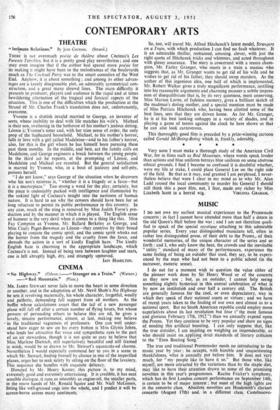CINEMA ,
"No Highway." (Odeon.)---“Stranger on a Train." (Warner.) Red Mountain." (Plaza.) MR. JAMES STEWART never fails to move the heart in some direction or another, and in the adaptation of Mr. Nevil Shute's No Highway he sets it revolving maternally, his whole character, forgetful, woolly and pathetic, demanding full support from all mothers. As the boffin whose calculations assert that the tail of a new passenger plane will fall off after a certain number of flying hours, but whose powers of persuading others to believe this are nil, he gives a lovely, sincere performance, almost, at last, making one believe in the traditional vagueness of professors. One can well under- stand how eager to sew on his every button is Miss Glynis Johns, who lends her attractive flat voice and sympathetic eyes to the part of an air stewardess, though it is not quite so easy to believe that Miss Marlene Dietrich, still superlatively beautiful and still framed in mink, would be so drawn to Mr. Stewart's aquascuta-ed charms. Nevertheless I would especially commend her to you in a scene in which Mr. Stewart, finding himself by chance in one of the imperilled planes, urges her to seek safety by sitting on the floor of the lavatory. This sequence she handles with exquisite delicacy. -Directed by Mr. Henry Koster, this picture is, to my mind, extremely good and extremely entertaining. It is credible, it has neat sensible dialogue, it runs as smoothly as engine-oil, the smaller parts, in the suave hands of Mr. ,Ronald Squire and Mr. Niall McGinnis, fitting like well-greased cogs into the whole, and I predict it will be screen-borne across many continents. So, too, will travel Mr. Alfred Hitchcock's latest model, Strangers on a Train, with which production I can find no fault-whatever. It is an admirable thriller, restrained, amusing, clever, with just the right quota of Hitchcock tricks and whimaies, and acted throughout with glossy assurance. The story is concerned with a tennis cham- pion, Mr. Farley Granger, who meets in a train a maniac who suggests that, as. Mr. Granger wants to get rid of his wife and he wishes to get rid of his father, they should swop murders. As the author of this ingenious idea, one half of which is implemented, Mr. Robert Walker gives a truly magnificent performance, instilling into his reasonable arguments and charming manner a subtle impres- sion of disequilibrium that is, by its very quietness, most unnerving. Miss Marion Lorne, of fadeless memory, gives a brilliant sketch of the madman's doting mother, and a special mention must be made of Miss Patricia Hitchcock who, having been allotted some of the best lines, sees that they are driven home. As for Mr. Granger, ' he is at his best looking unhappy in a variety of shades, and in playing a game of tennis against the clock he here shows us that he can also look carniverous.
This thoroughly good film is preceded by a prize-winning cartoon called Gerald McBoing-Boing which is, frankly, adorable.
Very soon I must make a thorough study of the American Civil War, for in films such as Red Mountain, where words speak louder than actions and blue uniform betrays blue uniform on some abstruse ethical grounds, I find I become so confused it is doubtful whether, were my life at stake, I could place General Lee on the right side of the field. Be that as it may, and granted I am perplexed, I never- theless believe that were I. clear in my mind as to why Mr. Alan Ladd roused the local community to murder his General I should still think this a poor film, not, I fear, made any richer by Miss






























 Previous page
Previous page